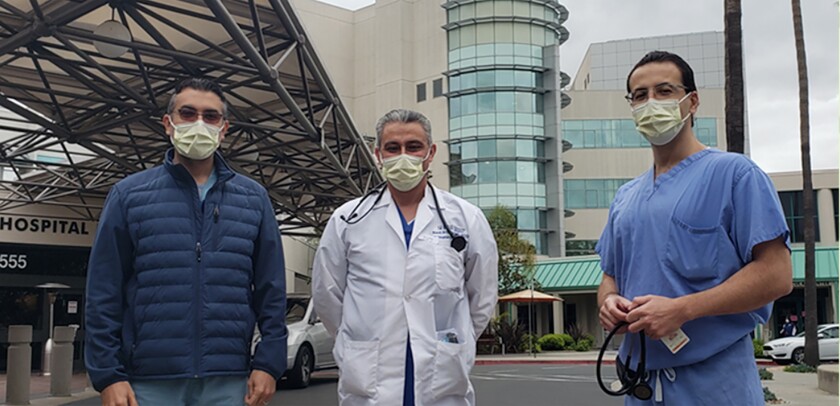[ad_1]
At Grossmont College, artists gathered last month to showcase some of their artwork as part of the “Arab Horizons” exhibit, which highlighted their different cultural perspectives on being Arab Americans.
Hyde Art Gallery partnered with Grossmont’s World Languages Department to present the mini-exhibition of regional, contemporary artists, Doris Bittar, Yasmine Kasem and Haneen Oriqat, according to gallery director Alex Decosta.
The exhibit was one of several efforts in April to mark Arab American Heritage Month and to recognize the contributions and challenges of Arab people in the San Diego area.
Lebanese painter Doris Bittar, who emigrated to the U.S. from Beruit before she was 6 years old, said the exhibit was a way to showcase some of the cultural differences across the Arab World, which encompasses parts of Africa, Europe and Asia in 22 countries where Arabic is the common language.
“Arab is not a religion — it’s a language culture,” she said. “It’s a very generous language, it’s a very flexible language, it’s a very adaptable language — like its people.”
To be an Arab, like an American, is a cultural rather than racial trait, and includes Muslims, Christians and Jews.
Bittar is also the California organizer for the American Arab Anti Discrimination Committee and has worked over the years to ensure civil rights for Arab Americans.
“The kinds of discrimination and history that Arab Americans have suffered from is one of invisibility — nobody knows; our voices aren’t heard; our stories aren’t told,” Bittar said.
San Diego has one of the largest Arab American communities in the county, Bittar said. However, many of their contributions to society go unrecognized.
Over the last couple of years, Dr. Raed Al-Naser has been working to gather COVID-19 data on Arab Americans after he realized, while on the front lines in the intensive care unit at Sharp Grossmont Hospital, they were being disproportionally affected by the pandemic. The pulmonary critical care physician in La Mesa is a Jordan native and the president of the San Diego chapter of the National Arab American Medical Association.
San Diego County’s COVID-19 data breakdown mirrors the U.S. census criteria, and because Arab Americans are counted as White in the census often patients from the Arab and Middle Eastern communities are listed simply as “unknown” or “other.” Through his research, Al-Naser found that Arab Americans had a higher risk of contracting the virus, especially in San Diego, which has a high population of immigrants and refugees who lack the socio-economic structures to protect them.
Without a dedicated ethnic identifier, Al-Naser said, COVID-19 disparities facing Arab Americans will be washed out and continue to go undocumented. Al-Naser is working with San Diego County Health and Human Services Agency to find ways to reduce these health disparities for Arab Americans.
“At this time where everybody is focused on diversity and equity, we want to make sure that our population is not forgotten because the Arab Americans have been forgotten for a long time for so many reasons,” Al-Naser said. He hopes to “identify these populations and target them with proper measures to improve health … and other socio-economic aspects of life.”

Dr. Raed Al-Naser, center, with colleagues at Grossmont Hospital. Al-Naser is a pulmonologist and critical care physician and president of the San Diego chapter of the National Arab American Medical Association.
(Courtesy photo)
Also little-known are the contributions of two Arab-American technology pioneers in San Diego. At Qualcomm in the late 1990s and early 2000s, Eygptian Samir Soliman and Palestinian Saed Younis were part of the advanced technology development group that enhanced cell phone technology.
While the group worked to make cell phones lighter, their signals stronger and their battery life longer, their most well-known achievement was when they adapted GPS technology in cell phones to improve location accuracy.
In the 26 years Soliman was at Qualcomm as vice president of technology, and then when he went on to create his own wireless consultancy company in 2016, he thrived in pushing technology boundaries. Soliman has assisted with thousands of filed, pending and issued patents in GPS, Wi-Fi and other mobile technologies.
Similarly, Younis has used his passion for technology to help Qualcomm lead efforts to establish a nationwide footprint for 3G mobile technology in the region.
Younis went on to create various startup companies. Currently, he is working to continue to develop commercial and residential wireless indoor positioning technology for inclusion in smartphones at LONPROX.
[ad_2]
Source link


:strip_icc()/BHG_PTSN19720-33d9cd22f6ab49e6a21982e451321898.jpg)

More Stories
Fresh and Airy Interior Design Living Room Ideas for Summer
Where Art and Sound Converge: Exploring Fine Art Photography and Music Artist Portraiture
Cooking Chinese Cuisine with Ease Using Jackery Solar Generator 5000 Plus